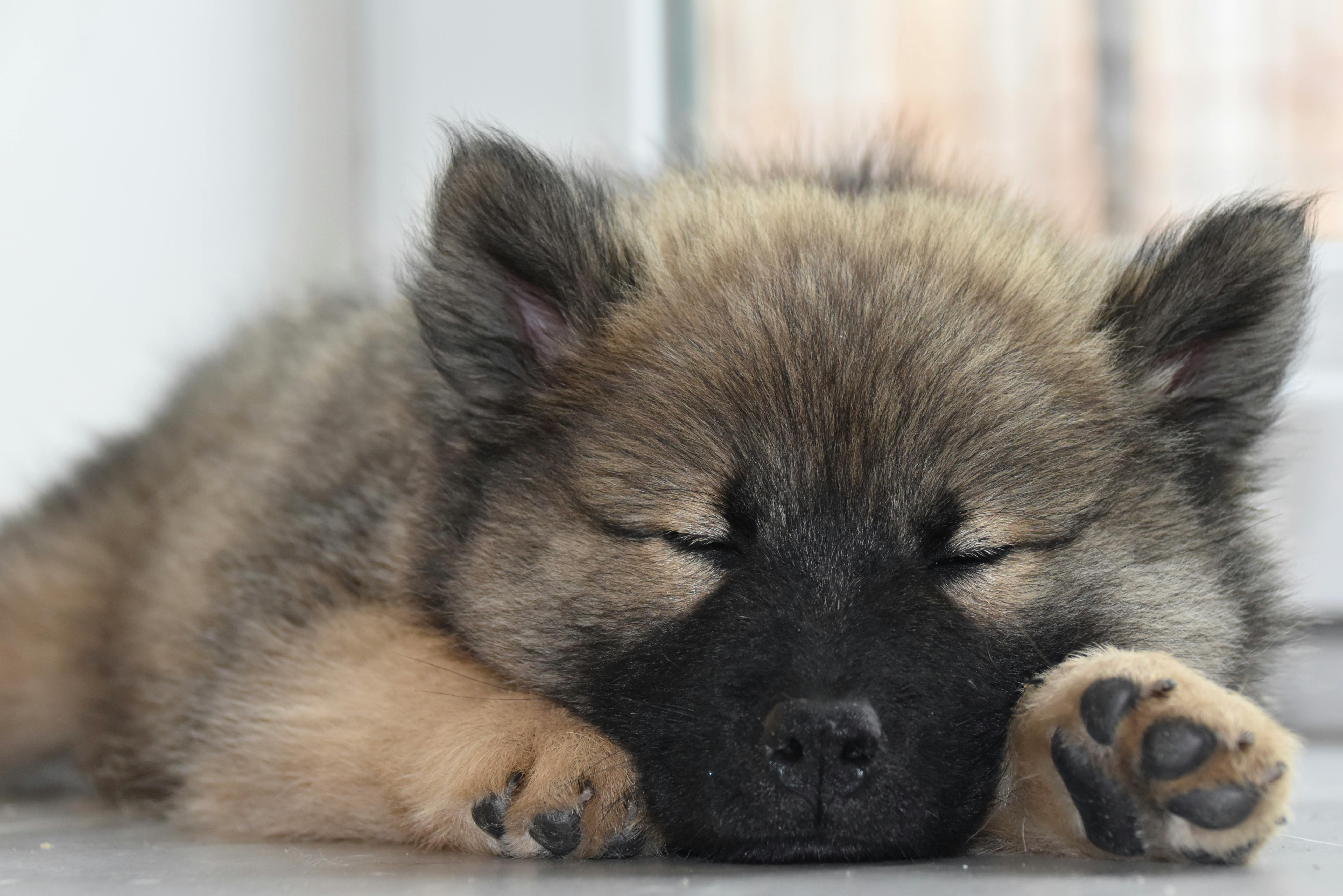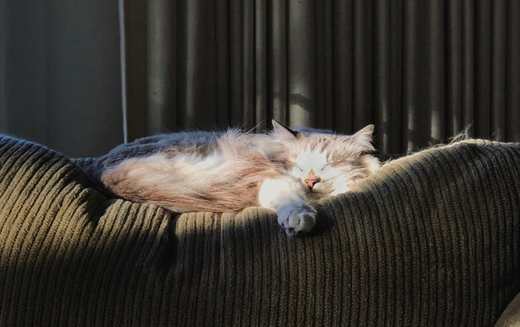Have you ever wondered why your cat seems to sleep the day away, only to race around the house like a mini superhero at night? Cats have a unique sleep cycle that might seem strange at first, but there's a lot of fascinating science behind it. Understanding how your pets sleep can help you better cater to their needs and even strengthen your bond with them.
Table of Contents:
- Key Takeaways
- Understanding the Cat Sleep Cycle
- How Much Do Cats Sleep?
- Cat Sleep Phases
- 3 Reasons Cats Sleep So Much
- How Cat Sleep Habits Differ From Humans
- When to Be Concerned About Your Cat's Sleep
- Conclusion
- Frequently Asked Questions
Key Takeaways
-
💤 Unique Sleep Patterns: Cats have a polyphasic sleep pattern, opting for short naps throughout the day and night rather than a single long sleep like humans.
-
🌅 Crepuscular Nature: Cats are most active during dawn and dusk due to their crepuscular nature, a trait inherited from their wild ancestors.
-
🛏️ Sleep Duration: On average, cats sleep between 12 and 16 hours a day, with kittens and older cats potentially needing more rest.
-
🐈 Sleep Phases: Cats experience both NREM and REM sleep phases, similar to humans, with dreaming occurring during the REM phase.
-
🐱 Energy Conservation: Cats sleep to conserve energy, regulate body temperature, and cope with boredom or environmental changes.
-
❗️ Health Indicators: Changes in your cat’s sleep patterns can indicate health issues; excessive sleep or significant decrease in sleep warrants a veterinary visit.

Understanding the Cat Sleep Cycle
Cats are known for their unique sleep patterns, which involve taking short naps throughout the day and night. Unlike humans, who usually sleep for one long stretch, cats have what’s known as a polyphasic sleep pattern.
How Many Hours Do Cats Sleep?
Cats usually sleep between 12 and 16 hours a day. Some cats might even sleep up to 20 hours. As cats get older, they tend to sleep more.
Sleep Patterns
Cats have crepuscular sleeping habits. This means they’re most active during dawn and dusk. You might notice your cat playing or hunting around sunrise or sunset. This behavior comes from their wild ancestors, who hunted during these times.
How Much Do Cats Sleep?
Cats are known for their love of sleep, often curling up for hours at a time. On average, they sleep between 12 and 16 hours daily, influenced by their age, lifestyle, and environment.
Average Sleep Duration
-
Kittens (0-4 weeks): Newborn kittens can sleep nearly 24 hours a day, aiding their rapid growth and development.
-
Juveniles (4-16 weeks): Kittens in this age group still sleep a lot but less than newborns, still needing enough rest for healthy growth.
-
Adults (1-7 years): Adult cats typically snooze for 12–16 hours per day, with their need for sleep affected by their activity levels when awake.
-
Seniors (7+ years): Older cats may sleep more, up to 20 hours, possibly because of health issues or reduced mobility.
Differences Between Kittens and Adult Cats
Kittens sleep more than adult cats, with newborns requiring up to 24 hours of sleep each day. This significant sleep allocation helps them grow and develop properly.
For more information on feline behaviors and tips on keeping your cat healthy, join the Welltayl newsletter! It’s easy and full of fun facts and useful advice for cat lovers.
Cat Sleep Phases
Cats, like humans, go through different sleep phases. These include NREM and REM sleep.
NREM Sleep
During the NREM (non-rapid eye movement) phase, cats are in a light sleep and can wake up easily. Their brain waves are slower and more irregular compared to REM sleep. They may fall in and out of NREM sleep several times before falling into REM sleep.
REM Sleep
During the REM (rapid eye movement) phase, you'll see rapid eye movements and sometimes twitching. There is increased brain activity, similar to during wakefulness. This is when cats dream.
3 Reasons Cats Sleep So Much
Cats sleep a lot to conserve energy, regulate body temperature, and cope with boredom or environmental changes.
1. Energy Recovery
Cats use a good amount of energy hunting or playing, even if they're indoor pets and not actually hunting for food. This significant energy usage means they need plenty of rest to recharge. For example, after a playful session chasing a toy mouse, a cat will often take a nap to recover.
2. Cooling Down
Cats sleep to help regulate their body temperature. In hot climates or during summer months, you might notice your cat sleeping more. This increased sleep helps them stay cool and conserve energy, preventing overheating.
3. Boredom and Environmental Factors
If cats lack enriching activities or mental stimulation, they tend to sleep more out of boredom. Changes in their environment, like moving to a new house or a new pet, can also make them sleep more as they adjust. Regular playtime and interactive toys can reduce this boredom-induced sleep.
How Cat Sleep Habits Differ From Humans
Crepuscular Nature
Cats are crepuscular, meaning they are most active during dawn and dusk. Unlike humans, who typically follow a diurnal (daytime) schedule, cats have evolved to hunt when their prey is most active.
Polyphasic Sleep Pattern
Cats have a polyphasic sleep pattern, sleeping multiple times a day. While humans usually sleep for one long period at night, cats take several short naps. Their naps last an average of 78 minutes, but often range between 50 and 113 minutes.
REM and NREM Sleep
Cats experience both REM (rapid eye movement) and NREM (non-rapid eye movement) sleep. Similar to humans, cats dream during REM sleep. NREM sleep allows their bodies to recharge and conserve energy.
Sleep Duration
Cats sleep much more than humans. Most cats sleep between 12 and 16 hours a day, while humans average about 7 to 9 hours per night. This extended sleep helps cats recover energy for their active periods.
Want to learn more about your cat's unique behaviors? Join the Welltayl newsletter for expert tips and fun facts about cats! Sign up today and make your understanding of cats even better.

When to Be Concerned About Your Cat's Sleep
Changes in your cat's sleep can sometimes signal health issues. Pay attention if you notice shifts in their sleeping habits.
Excessive Sleep and Lethargy
Cats naturally sleep a lot, usually between 12 and 16 hours a day. If your cat starts sleeping more than usual, it could indicate a problem. Conditions like kidney disease might cause your cat to sleep excessively. A typically active cat suddenly sleeping all day warrants a vet visit.
Restlessness and Decreased Sleep
If your cat is sleeping less, it might feel restless or agitated. Hyperthyroidism or lack of stimulation could be the cause. Watch for signs like frequent resituating or pacing and less frequent napping. If previous nap times shrink significantly, consider consulting your vet.
Conclusion
Understanding your cat's sleep cycle can help you ensure they're healthy and happy. By recognizing their natural sleep patterns and the significance of REM and NREM phases, you can better cater to their needs. It's important to provide mental stimulation and a dynamic environment to prevent excessive sleep. Keep an eye on any changes in their sleep habits, as these could indicate underlying health issues. Early detection and intervention can make a significant difference in your cat's well-being. Stay observant and proactive in maintaining your feline friend's health.
Stay Updated with More Pet Knowledge!
For more pet info and knowledge, consider signing up for the Welltayl newsletter. It's packed with helpful advice tailored for pet owners like you, ensuring your pets stay healthy and happy. Sign up today and keep up to date with the latest in pet care.
Frequently Asked Questions
Do cats stay up all night?
Many cat owners find their feline's nighttime habits frustrating, though the cause is natural. Cats are crepuscular, which means they are most active at dawn and dusk. Some kitties are more active through the night, but that doesn't make them nocturnal animals (a popular myth about our feline friends).
Do cats have an internal clock?
Just like humans, cats have their own circadian rhythm, an internal clock that helps them recognize wake time and sleep time. They will also pick up on body cues like feeling tired, hungry, or thirsty, to give them an idea of how much time has passed and remind them to nag you for food or wake you up.
How long do cats sleep in 24 hours?
Cats sleep on average 15 hours a day, with some sleepy kitties getting up to 20 hours of shut-eye each day. There are a few factors influencing how long a cat sleeps, age being one of the most prominent ones.
What is a cat's sleep pattern?
Unlike humans, who tend to sleep in one long time period at night, cats have a polyphasic sleep schedule that is marked by multiple shorter bouts of sleep across both day and night.
Why does my cat sleep with me?
Cats typically choose their sleeping partners based on comfort, safety, and affection. They often select the person they feel most bonded with or the one who provides them the most warmth and security. Cats also consider the consistency and familiarity of their environment when choosing their sleeping spot.
Resources:
Read more

Keep your dog safe in the heat with these essential tips. Learn how to prevent heatstroke, recognize symptoms, and provide proper care. Read more!

Learn about dog dreams, REM sleep, and how your dog experiences dream adventures. Should you wake them? and what they be dreaming about? Learn more.










